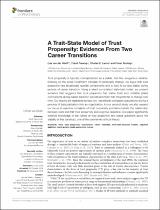| dc.contributor.author | van der Werff, Lisa | |
| dc.contributor.author | Freeney, Yseult | |
| dc.contributor.author | Lance, Charles E. | |
| dc.date.accessioned | 2023-06-29T09:14:18Z | |
| dc.date.available | 2023-06-29T09:14:18Z | |
| dc.date.issued | 2019 | |
| dc.identifier.citation | van der Werff, L. et al. (2019). A trait-state model of trust propensity: Evidence from two career transitions. Frontiers in Psychology, 10, 2490. 10.3389/fpsyg.2019.02490 | en_US |
| dc.identifier.issn | 1664-1078 | |
| dc.identifier.uri | https://doi.org/10.3389/fpsyg.2019.02490 | |
| dc.identifier.uri | http://hdl.handle.net/10566/9176 | |
| dc.description.abstract | Trust propensity is typically conceptualized as a stable, trait-like, exogenous variable.
Drawing on the social investment principle of personality change, we argue that trust
propensity has situationally specific components and is likely to be less stable during
periods of career transition. Using a latent curve-latent state-trait model, we present
evidence that suggests that trust propensity has stable (trait) and unstable (state)
components during career transition periods and that it has the potential to change over
time. Our results are replicated across two, transitional workplace populations during a
process of (re)socialization into an organization. In our second study, we also expand
our focus to examine correlates of trust propensity and demonstrate the relationship
between state and trait trust propensity and cognitive depletion. Our paper significantly
extends knowledge of the nature of trust propensity and raises questions about the
stability of this construct, one of the core tenets of trust theory. | en_US |
| dc.language.iso | en | en_US |
| dc.publisher | Frontiers Media | en_US |
| dc.subject | Cognitive depletion | en_US |
| dc.subject | Psychology | en_US |
| dc.subject | Social development | en_US |
| dc.subject | Personality literature | en_US |
| dc.subject | Socialization | en_US |
| dc.title | A trait-state model of trust propensity: Evidence from two career transitions | en_US |
| dc.type | Article | en_US |

